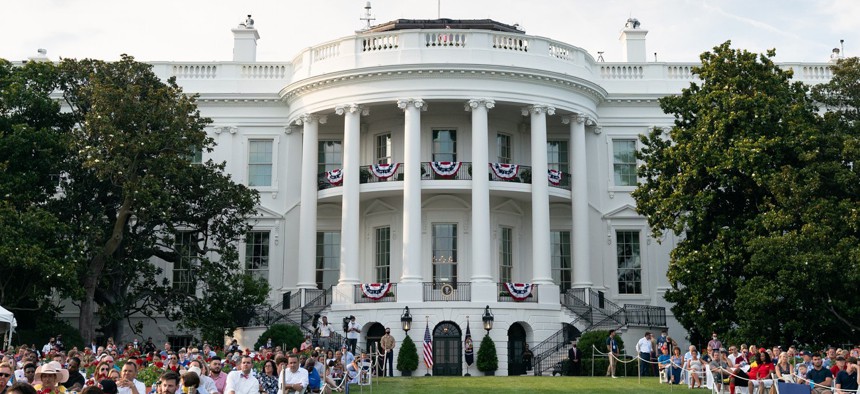
The White House celebration on July 4. Official White House Photo by Andrea Hanks
House Appropriations Bill Keeps Trump’s 1% Raise for Feds, Blocks other White House Priorities
The legislation would prevent the Trump administration from moving forward with its proposed GSA-OPM merger as well as implementation of new union contracts.
House appropriators appear poised to accept President Trump’s proposed 1% across-the-board pay increase for civilian federal employees in 2021 as they advance annual spending bills, although Democrats have taken steps to protect federal employees in other ways.
In February, Trump proposed a 1% increase in basic pay for all federal workers, and keeping locality pay at 2020 levels as part of the White House’s fiscal 2021 budget request. The president also took the unusual step of formally issuing an alternative pay plan in February, a measure that overrides automatic increases called for under the Federal Employee Pay Comparability Act but typically is not done until August each year.
The House Appropriations Committee on Tuesday unveiled its Financial Services and General Government spending bill, which is silent on federal employee compensation, effectively endorsing the White House’s plan. Overall, the legislation accounts for nearly $25 billion in discretionary spending, an increase of $808 million over fiscal 2020.
Although the bill does not take steps to override the president’s federal employee pay raise plan as it did for the previous three years in the face of proposed pay freezes, it declines to implement a slew of proposed cuts to federal workers’ retirement programs and other non-salary benefits.
The bill renews Democrats’ efforts to prevent the Trump administration from moving forward with its goal to dismantle the Office of Personnel Management and send its human resources functions to the General Services Administration and its policy arm to the White House.
Last year, Congress put the merger on hold, instructing the administration to commission a year-long independent study of the issue from the National Academy of Public Administration. In recent days, the administration has come under fire over reports that officials misled lawmakers by failing to disclose that they had received legal analysis that the proposal was illegal.
The spending bill prohibits federal funding be used to transfer “any function or authority” from OPM to GSA or to the Office of Management and Budget, and it requires that the administration provide a report to Congress at least 15 days prior to implementing any interagency agreement between OPM and GSA worth at least $100,000.
The bill also revives a proposal aimed at protecting federal employee unions from controversial new collective bargaining agreements. Over the past year, unions have objected to agencies conducting so-called “box-checking” bargaining, where agencies rush through the negotiations process to get before the Federal Service Impasses Panel, which is now the subject of multiple lawsuits.
If enacted, agencies would be prohibited from implementing or enforcing any collective bargaining agreement that has not been “mutually and voluntarily agreed to by all parties” or the result of binding arbitration. The provision is retroactive to April 30, 2019, meaning several agencies would be required to roll back and reimplement previous union contracts.
The legislation also includes language making Deferred Action for Childhood Arrivals recipients eligible to apply for federal jobs.
Lawmakers are slated to consider the bill at the subcommittee level on Wednesday, after which point it will go to the full House Appropriations Committee. In the other chamber, senators last month pushed back their timeline for development and consideration of appropriations bills, in part due to the need to consider emergency legislation responding to the coronavirus pandemic and reacting to nationwide protests demanding police reform.







